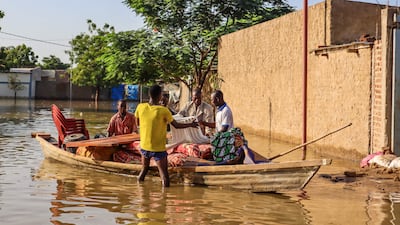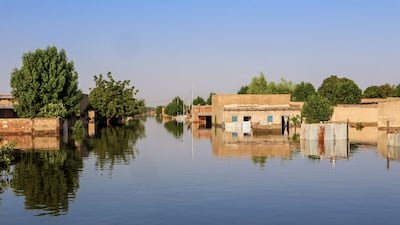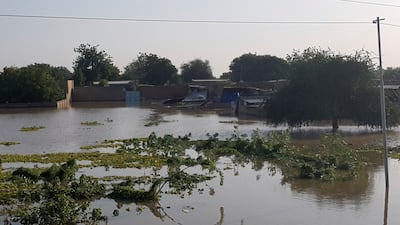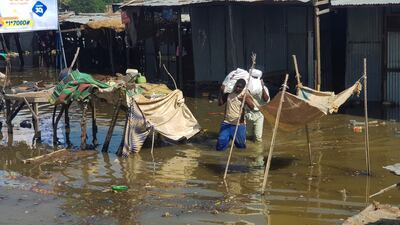Around 50 people have been killed in Chad, including "about 10" members of the security forces, as police and protesters clashed on Thursday, Prime Minister Saleh Kebzabo told a news conference on Thursday.
Violence broke out after demonstrators barricaded roads and torched the prime minister's party headquarters in capital N'Djamena as hundreds took to the streets to demand a quicker transition to democratic rule after President Mahamat Idriss Deby seized power last year.
A national unity government was formed on Friday to lead Chad for the next two years until elections. But critics are demanding a swifter return to democracy.
Police fired tear gas and rubber bullets to break up gatherings throughout the city.
The government said security forces acted only in self-defence.
"What happened today is an armed popular uprising to seize power by force and those responsible for this violence will face justice," said Kebzabo.
"The demonstrators had firearms and they are considered rebels."
Demonstrators demanding a quicker transition to democratic rule barricaded roads and torched the party headquarters of the new prime minister as hundreds took to the streets, Reuters reported.
"I firmly condemn the repression of demonstrations that led to deaths in Chad," African Union Commission Chairman Moussa Faki Mahamat, who is a former prime minister of Chad, wrote on Twitter.
The vast military-run Central African nation has been in crisis since the death of President Idriss Deby in April 2021, who ruled with an iron fist for three decades. Deby was killed while visiting troops fighting rebels.
There has been resistance to a transitional military council headed by Deby's son, Mahamat Idriss Deby Itno, who took power after the president's death and pushed back elections to October 2024.
Opposition and civil society groups called the protests on Thursday, which would have marked the end of an initially agreed 18-month transition period. The government banned them citing security reasons.
But demonstrators showed up early in the morning, using burning tyres and debris to block roads in the capital.
Police fired teargas and rubber bullets to break up gatherings throughout the city, killing at least three people and wounding several.
Heavy flooding
It comes after Chad declared a state of emergency as the country is hit with its worst flooding for three decades.
Heavy rains caused floods in 18 of the country's 23 provinces — displacing more than a million people, the president said on Wednesday.
The flooding destroyed thousands of hectares of crops and “swallowed up … 19,000 heads of livestock”, said Mr Deby. No deaths were reported.

Mr Deby said: “A state of emergency will be instituted to better contain and manage this natural disaster situation.
“The areas most at risk are the capital N'Djamena and surrounding areas.”
He called the situation “increasingly worrying”.
In N'Djamena, a field of tents has sprung up to provide emergency shelter and victims are striving to salvage what they can from the ruins of their homes, AFP reported on Wednesday.
In Walia, a poor neighbourhood to the south of the city, dozens of homes were ravaged last week after the Chari River burst its banks following torrential rain, the report said.
Water levels rose by up to five metres, which local officials said was unprecedented, and swept aside makeshift defences erected by desperate inhabitants.
Economic crisis
Chad is the world's third-poorest country, according to the UN's Human Development Index. The UN said 5.5 million citizens were in need of “emergency humanitarian aid”.
The country is facing a looming food crisis affecting more than two million people, the World Food Programme said.
Mr Deby said the nationwide state of emergency would help tackle the humanitarian situation in the worst-hit areas in the south, including N’Djamena.
The World Bank said 42 per cent of Chad's 16 million population live in poverty.
“We have to provide shelter, basic necessities and health protection,” Mr Deby said. “We have to thank the Almighty who has spared us the loss of life until now.”
He urged “friendly countries” and “technical and financial partners” to support the government's efforts.
The state of emergency comes as the landlocked oil producer’s military government faces growing discontent after extending by two years an 18-month deadline for a return to civilian rule.










